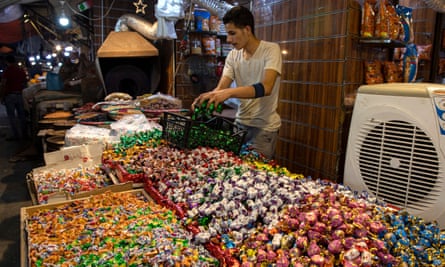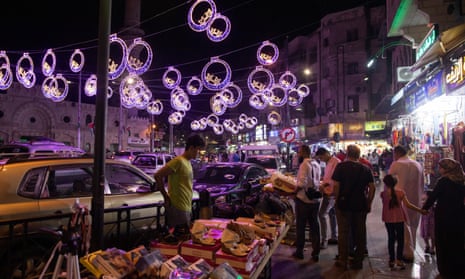Outside bakeries in downtown Amman, queues stretched along the street and down the block. Nut retailers were mobbed, and sweet shops were down to their last desserts. It was as if coronavirus had never existed.
The nights before Eid al-Fitr, the festival that ends the fasting month of Ramadan and which began on Sunday at dawn, are always busy. But this year the urgency was greater: Jordanians are celebrating this holiday under three days of full curfew. Everything is closed and nobody is allowed out of their homes for any reason.
“It’s sad, it hurts,” said Mohammad, who runs a sugarcane juice stall. “Normally we’d wake up, take our kids to pray, and visit family and friends. It was cheerful, we felt joy.” This year? “We’ll eat, drink and sleep,” he said. “And we’ll hang around annoying our wives,” said his father, grinning behind him.
Contact with family and friends is part of the festival. “We’ll visit them,” said Abdul Kareem, queuing outside a bakery. “But it’ll be on WhatsApp, Skype, Facebook.”
The owner of a nearby shoe shop, Wissam, watched the bustle from his door. “This isn’t right,” he says of the busy scene. “There’s a virus out there.”
Jordan has so far dodged the worst of Covid-19, but the lockdown has left its mark. Normal Eid celebrations would involve buying new clothes to wear at meals and to the mosque, and as gifts to family and friends. “Now there’s no money,” Wissam says. “What people have they spend on food.”
Around the world, this year’s celebrations are severely constrained by the pandemic. Instead of communal prayers at mosques or in the open air, large gatherings of family, friends and neighbours, and outings to enjoy special street lights and festivities, many of the world’s two billion Muslims will be in lockdown. Some countries have imposed curfews, and religious authorities have told people to pray at home.
In Iran, the centre of the pandemic in the Middle East, there has been a fresh surge in Covid cases since the government began lifting restrictions, allowing people back to work in mid-April and to communal prayers at mosques in the first week of May.
Critics said moves to reopen the economy had been made before critical benchmarks indicatingthe spread of the disease had been brought under control were met. Official Covid figures – 7,300 dead and almost 132,000 infected – are widely thought to be an underestimate, and the government has been criticised for its response to the outbreak, which began in mid-February.
Since the new surge in cases in a number of provinces, including Tehran, the president Hassan Rouhani cancelled Eid prayers led by Iran’s supreme leader, Ayatollah Ali Khamenei. But he has permitted prayers to be held outside some mosques with physical distancing.
Last week health minister Saeed Namaki appealed to Iranians to avoid travelling during Eid. “Such trips mean new cases of infection … people should not travel to and from high-risk areas,” Namaki said.,.
“Some 90% of the population in many areas has not yet contracted the disease. In the case of a new outbreak, it will be very difficult for me and my colleagues to control it,” he said.
In Pakistan, where more than 10% of the world’s Muslim population live, there has also been an increase in the number of infectionsfollowing a recent lifting of lockdown. The government has urged people to act responsibly over the country’s six-day Eid holiday, but has not announced any special precautions.
Celebrations were expected to be muted anyway after a plane crash in Karachi on Friday which killed at least 97 people. Flight PK8303 had been carrying many families travelling for Eid when it plunged into a residential neighbourhood near Jinnah International airport.
Saudi Arabia, meanwhile, has ordered a 24-hour curfew over Eid, an extension to the current overnight curfew between 5pm and 9am. Egypt is also implementing a longer overnight curfew during the festival, starting at 5pm instead of 9pm, and ending at 6am, and Turkey has ordered a nationwide lockdown starting on the eve of Eid.

The Saudi grand mufti urged Muslims to pray at home. “It is permissible to perform the Eid al-Fitr prayer at home under exceptional circumstances similar to the current pandemic situation,” said Sheikh Abdulaziz al-Sheikh
The council of senior scholars at Al Azhar university in Cairo, Egypt’s main religious authority, also said Eid prayers should be conducted at home in accordance with the Islamic injunction to preserve lives. Restaurants, cafes and parks will remain closed over the holiday.
In Gaza, where there have only been 55 cases of Covid infection after the government ordered strict quarantine for those testing positive, mosques will be partially reopened for Eid prayers.
Those praying inside mosques have been told to maintain distance from each other, bring their own prayer mats and wear face masks. Older people and children are urged to pray at home.
In the UK, the Muslim Council of Britain and the Mosques and Imams National Advisory Board have said Eid must be celebrated at home.
Qari Asim, an imam in Leeds, said: “The Eid prayer is something that Muslims look forward to all year long. However, with mosques remaining closed in line with government guidance, no Eid prayer will take place in mosques or open spaces, public parks.
“This is extremely challenging and distressing for us. There is a palpable sense of sadness in the community given that usually mosques are jam-packed with people. Not being able to be with our loved ones this Eid will be painful but we’ve all got to just get through this in the best way we can.”
Additional reporting by Jassar Al-Tahat
